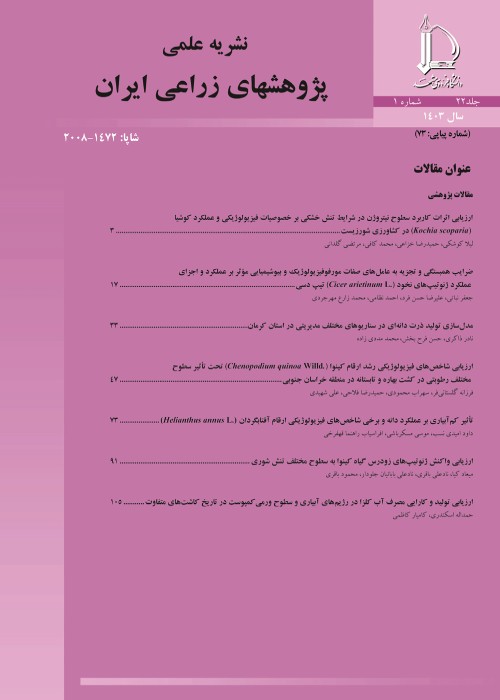Effects of Biochar, Seed Priming and Foliar Application of Water and Salicylic Acid on Yield of Rainfed Safflower
Author(s):
Article Type:
Research/Original Article (دارای رتبه معتبر)
Abstract:
Introduction
Safflower (Carthamus tinctorius L.) is one of the oldest seed oil crops cultivated and is known for drought tolerance due to partially xerophytes nature, as well as deep and extensive root system making efficient use of reserved soil moisture. Seed germination depends on environmental factors especially temperature and humidity. Seed priming is one of the current methods for increasing the rate, percentage, germination uniformity and seed emergence under environmental undesirable. Seed priming with plant growth regulators especially salicylic acid improved quality and seed yield. Salicylic acid acts as anti-transpiration and inhibited from open stomata. Salicylic acid plays an important role in plant consistency to osmotic stress, high salinity, oxidative stress, high temperature, and freezing stress. Biochar is created by pyrolysis of natural materials. Biochar increased the soil porosity and therefore improved water retention capacity in soil. It was reported that application of 2.5, 5, 10, 20, 30 and 40 t/ha biochar increased canola yield by 16.21, 21.15, 27.99, 24.60, 33.20 and 36.02% compared with control, respectively.
Materials and Methods
To evaluate the effect of biochar and seed priming with salicylic acid and water along with foliar application on yield, yield components and oil percentage of safflower in rain fed condition, an experiment was performed as split- split plot based on randomized complete blocks design in three replications, at the Research Station of Islamic Azad University, Arak Branch, Iran, during 2016-2017. Experiment factors were included biochar in three levels of 0, 5 and 10 t/ha; seed priming in three levels of zero priming, priming with water distillation and seed priming with 0.5mM salicylic acid and foliar application in two levels of foliar application with water and 1 mM salicylic acid. Seeds primed for 12 hr at distilled water and salicylic acid solutions then dried at shade. Biochar was applied at 15 cm depth and under the seed, before sowing. Each experimental plot included 30cm spacing rows with 15cm spacing between plants in rows. The safflower cultivar was ‘Esfahan native’. The seeds were sown at 3-4 cm depth in middle of March 2016. The assay for agronomic traits, yield and yield components was determined from 10 plants. Data were subjected to analysis of variance using SAS. The Duncan's multiple range test at 5% the confidence level were used to compare means.
Results and Discussion
Results showed that the application of 5 and 10 t/ha biochar increased seedling emergence percentage by 23.7 and 40.4% compared to control. Increasing of seedling emergence percentage by seed priming can be due to repair of deteriorated seed, improve DNA representation and decrease of germination base temperature. Application of 5 t/ha biochar increased the number of heads per plant by 15.9% compared to control. Seed priming with distilled water increased the number of heads per plant by 7% compared to control. Seed priming with water distilled along with the foliar application by water increased number of fertile heads per plant by 13.9 percentages as compared with control. The highest number of seeds per head was recorded by the application of 5 t/ha biochar and seed priming with water distillate. Application of 10 t/ha biochar combined with foliar application of salicylic acid, 5 t/ha biochar combined with foliar application of water and application of 10 t/ha biochar combined with foliar application of water increased the number of seeds per head by 13.4, 9.8 and 2.9 compared with control, respectively. The maximum of the 100-grain weight obtained from the application of 10 t/ha biochar combined with seed priming by distilled water that increased the 100-grain weight by 17.4% as compared with control. Application of 5 t/ha biochar along with seed priming with water or salicylic acid increased seed yield by 22.4 and 8.7% compared to control, respectively. Application of 5 t/ha biochar combined with a spray of water or 10 t/ha biochar along with the foliar application of salicylic acid increased grain yield by 18.7 and 21.9% compared with control, respectively. Increasing grain yield in rice and sorghum by biochar was reported. The highest oil percentage was obtained from the application of 5 t/ha biochar and seed priming with water along with the foliar application of salicylic acid.
Conclusions
In general, it is concluded that seed priming by water or salicylic acid along with the application of 5 t/ha biochar combined with foliar application of water in two stages in the duration of growth improved agronomic traits and grain yield of safflower in Rain-fed Condition.Keywords:
Language:
Persian
Published:
Iranian Journal of Field Crops Research, Volume:17 Issue: 2, 2019
Pages:
305 to 316
magiran.com/p1992653
دانلود و مطالعه متن این مقاله با یکی از روشهای زیر امکان پذیر است:
اشتراک شخصی
با عضویت و پرداخت آنلاین حق اشتراک یکساله به مبلغ 1,390,000ريال میتوانید 70 عنوان مطلب دانلود کنید!
اشتراک سازمانی
به کتابخانه دانشگاه یا محل کار خود پیشنهاد کنید تا اشتراک سازمانی این پایگاه را برای دسترسی نامحدود همه کاربران به متن مطالب تهیه نمایند!
توجه!
- حق عضویت دریافتی صرف حمایت از نشریات عضو و نگهداری، تکمیل و توسعه مگیران میشود.
- پرداخت حق اشتراک و دانلود مقالات اجازه بازنشر آن در سایر رسانههای چاپی و دیجیتال را به کاربر نمیدهد.
دسترسی سراسری کاربران دانشگاه پیام نور!
اعضای هیئت علمی و دانشجویان دانشگاه پیام نور در سراسر کشور، در صورت ثبت نام با ایمیل دانشگاهی، تا پایان فروردین ماه 1403 به مقالات سایت دسترسی خواهند داشت!
In order to view content subscription is required
Personal subscription
Subscribe magiran.com for 70 € euros via PayPal and download 70 articles during a year.
Organization subscription
Please contact us to subscribe your university or library for unlimited access!


